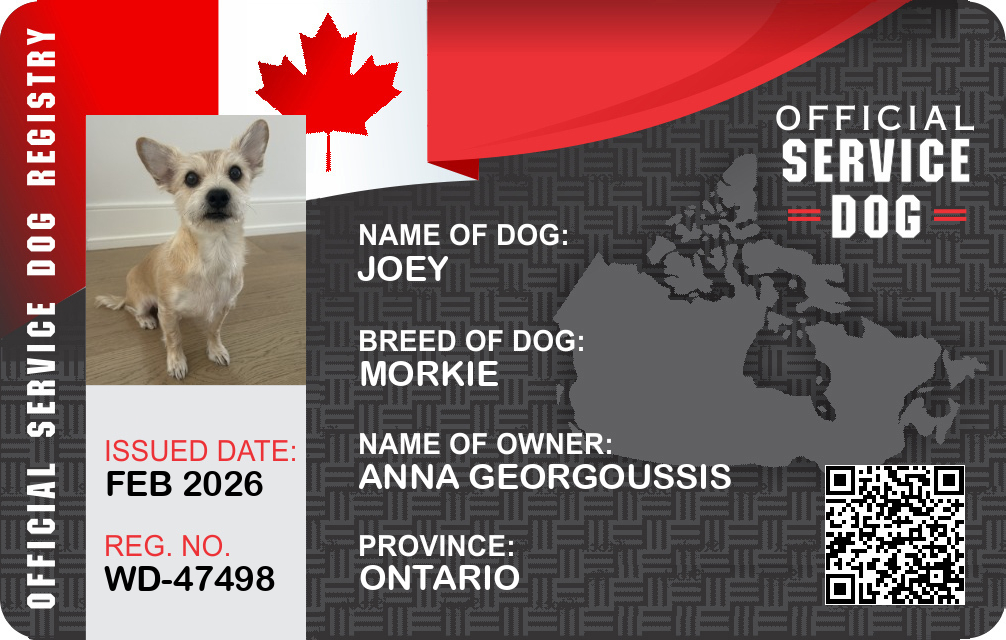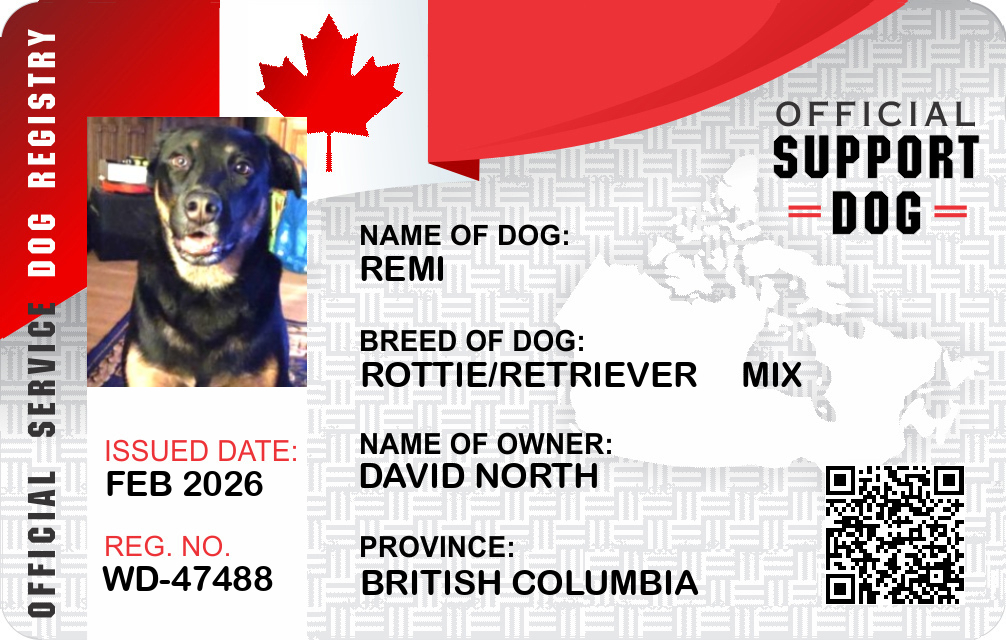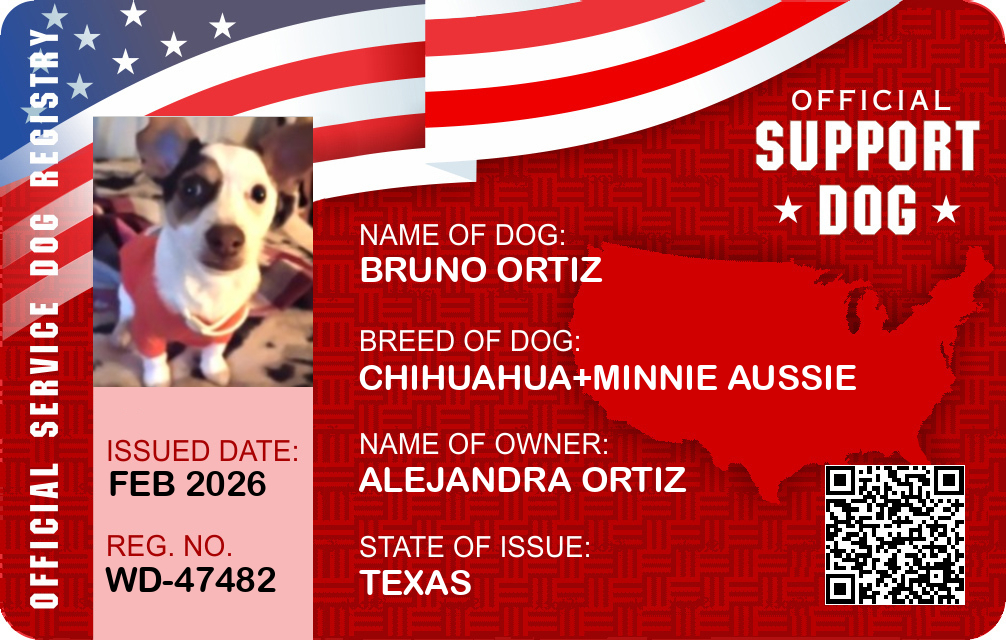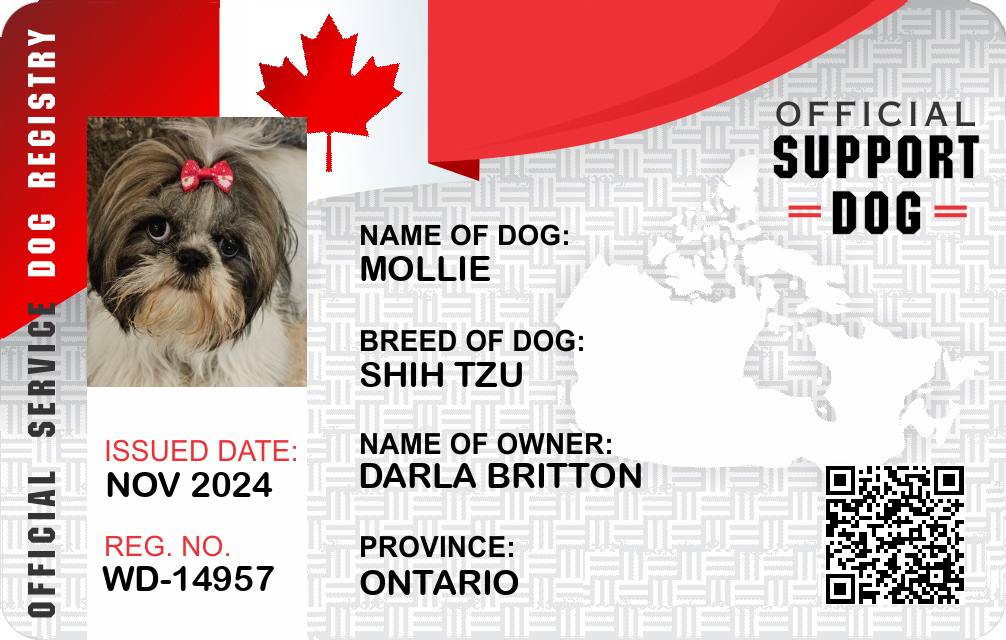Tennessee Service Dog Laws
Get Your Documents
Example State Cards


Service dogs play a crucial role in the lives of many individuals with disabilities, offering them increased independence and support. Tennessee, like other states, adheres to federal guidelines while instituting additional regulations specific to its jurisdiction. This article provides a comprehensive guide to understanding service dog laws in Tennessee, covering definitions, rights, restrictions, and practical advice for handlers.
Overview of Service Dog and Legal Definitions in Tennessee
What is a Service Dog?
A service dog is defined under federal law as a dog individually trained to perform specific tasks that mitigate their handler’s disability. This denotes that the dog’s function is directly related to assisting an individual with a disability, such as guiding people who are blind, alerting individuals who are deaf, pulling a wheelchair, alerting and protecting a person who is having a seizure, or mitigating other types of disabilities. In Tennessee, this definition aligns closely with the federal definition.
How Service Dogs Differ from Other Types of Assistance Animals
Service dogs are distinct from other types of assistance animals like emotional support animals (ESA) or therapy animals. While ESA provide comfort and may alleviate symptoms of depression or anxiety, they are not trained to perform specific tasks related to a disability. As such, ESA don’t have the same public access rights as service dogs under the Americans with Disabilities Act (ADA). Therapy animals, often used in therapeutic settings, are also not afforded the same legal rights as service dogs, as they are not individually trained to assist a specific handler with a disability.
Key Federal Laws Affecting Service Dogs (e.g., ADA, FHA, ACAA)
Service dog laws in Tennessee are significantly influenced by federal regulations:
- Americans with Disabilities Act (ADA): This federal law ensures service dogs are granted access to public places, such as restaurants, hotels, and retail stores, without discrimination based on disability.
- Fair Housing Act (FHA): This law requires housing providers to make reasonable accommodations for individuals with disabilities and their service animals, even in properties with no-pet policies.
- Air Carrier Access Act (ACAA): Governing air travel, this act requires airlines to accommodate service dogs accompanying individuals with disabilities.
State-Specific Service Dog Laws in Tennessee
Housing Rights and Responsibilities
In Tennessee, under the protections afforded by the FHA, individuals with service dogs are entitled to reside in housing that might otherwise prohibit pets. Landlords are required to permit residents with disabilities to keep service dogs, provided the animal is necessary due to a disability and performs assistive tasks. Tenants are usually not required to pay additional fees for their service dogs, although they are responsible for any damage the animal might cause.
Public Access and Accommodation
Service dogs must be granted access to all public accommodations in Tennessee, mirroring federal ADA regulations. Public accommodations include places such as restaurants, hotels, theaters, and public transport services. Establishments cannot demand special identification for the dog or inquire about the handler’s disability, though they may ask if the dog is a service animal required due to a disability and inquire about the tasks the dog is trained to perform.
Transportation and Travel Rules
Under Tennessee state laws and federal guidelines like the ACAA, service dogs can accompany their handlers in most modes of public transportation. Access to buses, trains, and planes cannot be denied based on the animal’s presence. While airlines may have their own rules about documentation and advance notice for bringing a service dog onboard, they must comply with federal standards ensuring the dog can fly in the cabin without a pet fee.
Employment and Workplace Considerations
The ADA also ensures workplace accommodations for individuals with service dogs. Employers in Tennessee are obliged to allow service animals in the workplace as part of reasonable accommodations for employees with disabilities, provided this does not impose an undue hardship on the operation of the business.
Documentation, Requirements, and Processes in Tennessee
Service Dog Documentation and Who Can Issue It
In Tennessee, there is generally no requirement for service dogs to carry special documentation or certifications to verify their status. It’s essential to differentiate between legitimate service dogs and those merely labeled as such without proper training or function. Legitimately issued documentation may come from credible training programs or veterinarians confirming the dog’s status and vaccination records, though these are typically not mandated by law.
Landlord, Business, and Provider Verification Rules
Businesses, landlords, and service providers in Tennessee can ask only two specific questions about a service dog: Is the dog a service animal required because of a disability, and what tasks is the dog trained to perform? Demanding medical documentation, certification, or identification is prohibited, protecting the privacy and rights of individuals with disabilities.
Rights, Limitations, and Legal Risks
Rights Service Dog Handlers Have in Tennessee
Handlers of service dogs in Tennessee have the right to public access, equitable housing accommodations, and the ability to fly and use public transport with their service animals without discrimination. They hold legal protections ensuring freedom from harassment and denial of access based on their disability.
Limits on Service Dog Protections and Common Restrictions
While Tennessee broadly protects service dog access, some limitations exist. Service dogs can legally be denied entry if they are out of control and the handler does not take effective action to control them or if the dog is not housebroken. Additionally, while emotional support animals are valuable to many, they do not have the same legal standing as service dogs in public and many other settings.
Penalties for Fraud or Misrepresentation
Tennessee enforces penalties for fraudulently misrepresenting a pet as a service dog. Those found guilty of this misdemeanor may face fines and community service, aimed at preserving the integrity and needed access for legitimate service animals and their handlers.
Practical Guidance for Service Dog Handlers in Tennessee
How to Qualify for a Service Dog Legitimately
To qualify for a service dog in Tennessee, an individual must have a disability as defined by the ADA and require an animal that performs tasks to aid their condition. Prospective handlers should work with credible service dog organizations to ensure appropriate training and alignment with legal standards.
How to Talk to Landlords, Airlines, and Employers
Communication is key for service dog handlers. When engaging with landlords, clearly explain the role of your service dog and provide necessary documentation to ease understanding. For airlines, check their policies well in advance; it may be helpful to inform them of your service dog when booking flights. Employers should be approached with requests for reasonable accommodations, highlighting how the service dog enables job performance.
Summary of Service Dog Laws in Tennessee
**- Service dogs are protected under both federal and state law in Tennessee, offering wide-ranging access rights.
- Handlers are not required to pay additional fees for their service dogs in housing or public spaces.
- Denial of access based on a service dog’s presence is mostly prohibited, except in specific situations where the animal’s behavior or health rules are at risk.
- Misrepresenting a non-service animal as a service dog can incur severe legal consequences.
- Handlers must be prepared to discuss their dog’s role clearly and provide necessary documents when requested by airlines or landlords, although they are not required to show medical records.
Understanding and adhering to these guidelines ensures that service dogs continue to effectively support their handlers while maintaining the integrity of service animal roles in society.**
Get Your Documents
Example State Cards













